
JMIR Medical Informatics
Scope & Guideline
Navigating the Future of Health Systems with Insightful Research
Introduction
Aims and Scopes
- Health Data Management and Interoperability:
The journal explores methodologies and technologies that enhance the management and interoperability of health data, including electronic health records (EHR) integrations and standards like FHIR. - Artificial Intelligence in Healthcare:
A significant focus on the application of AI, including machine learning and natural language processing, to improve diagnostic accuracy, patient outcomes, and operational efficiencies in healthcare settings. - Patient-Centered Innovations:
Research highlights the development of tools and systems that empower patients, such as mobile health applications and telehealth solutions, to enhance engagement and self-management of health. - Clinical Decision Support Systems:
The journal covers the design, implementation, and evaluation of clinical decision support systems that aid healthcare providers in making informed decisions based on real-time data. - Public Health and Epidemiology:
Research includes studies utilizing health informatics to address public health challenges, improve disease surveillance, and manage health crises, particularly in the context of COVID-19. - Ethics and Policy in Health Informatics:
The journal discusses ethical considerations, policy implications, and governance related to health data usage, privacy, and the impact of technology on healthcare delivery.
Trending and Emerging
- Generative AI Applications:
Research on the applications of generative AI, particularly in medical documentation and patient interactions, is gaining traction as healthcare seeks to leverage AI for efficiency and accuracy. - Data Quality and Integrity:
There is an increasing emphasis on the quality and integrity of health data, with studies focusing on methodologies to evaluate and enhance data quality for better clinical outcomes. - Predictive Analytics and Risk Assessment:
Emerging themes involve the use of predictive analytics to assess risks and outcomes in patient populations, particularly in chronic disease management and acute care settings. - Integration of Social Determinants of Health (SDOH) in Clinical Practice:
Research is increasingly addressing how SDOH are integrated into health informatics systems to improve patient care and outcomes. - Patient-Generated Health Data (PGHD):
The role of PGHD in clinical decision-making and patient engagement is becoming a prominent theme, highlighting the importance of incorporating patient insights into care models. - Cross-Country Health Informatics Studies:
There is a growing trend towards comparative studies across different countries, exploring how diverse healthcare systems implement informatics solutions.
Declining or Waning
- Traditional Clinical Informatics Frameworks:
There is a noticeable reduction in studies focused on traditional clinical informatics frameworks, as the field shifts towards more innovative and technology-driven approaches. - Hardware-Driven Innovations:
Research related to hardware advancements in healthcare technology, such as specific medical devices, has seen a decline, with a greater emphasis now on software solutions and data analytics. - General Health IT Adoption Studies:
Studies focusing solely on the adoption of health IT without specific applications or innovations are less common, reflecting a shift towards more applied and outcome-oriented research. - Standalone Telehealth Evaluations:
As telehealth becomes integrated into broader health informatics systems, standalone evaluations of telehealth efficacy are becoming less frequent. - Single-Center Studies:
There is a waning interest in single-center studies, with a trend towards multicenter collaborations and larger-scale analyses that provide more generalizable results.
Similar Journals
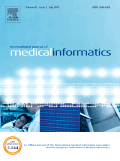
INTERNATIONAL JOURNAL OF MEDICAL INFORMATICS
Championing Excellence in Medical Informatics ResearchInternational Journal of Medical Informatics, published by Elsevier Ireland Ltd, is a premier peer-reviewed journal dedicated to advancing the field of health informatics. Established in 1997, this journal has consistently strived to disseminate high-quality research and innovative practices, now recognized in the Q1 quartile of health informatics for 2023, ranking impressively at #24 out of 138 in Scopus. The journal's focus encompasses the integration of computer science and information technology in healthcare, fostering discussions on data management, telemedicine, health information systems, and decision support mechanisms. With an ISSN of 1386-5056 and E-ISSN of 1872-8243, it provides options for both subscription and open access, ensuring broad dissemination of research findings. As a vital resource for researchers, professionals, and students in the rapidly evolving domain of medical informatics, the International Journal of Medical Informatics is positioned to be at the forefront of knowledge translation in the health sector, contributing significantly to improvements in patient care and healthcare delivery.
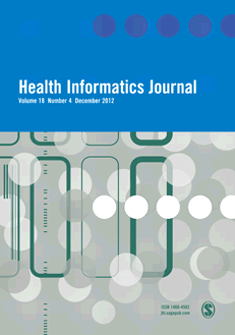
Health Informatics Journal
Transforming health delivery with cutting-edge research.Health Informatics Journal, published by SAGE Publications Inc., serves as a premier platform for research and discussion in the dynamic field of health informatics since its inception in 1995. With an impressive Q2 ranking in the Health Informatics category and a notable 77th percentile ranking in the Scopus database, this journal provides an essential resource for academics and professionals alike. The journal's transition to Open Access since 2020 has further broadened its reach, ensuring that innovative research is accessible to a global audience. Covering a wide range of topics within health informatics, the journal aims to foster high-quality scholarly communication and facilitate the dissemination of cutting-edge insights that can help advance health care delivery and patient outcomes. With an ongoing commitment to excellence, the Health Informatics Journal is dedicated to enhancing the intersection of technology and healthcare through rigorous research and collaborative exploration.
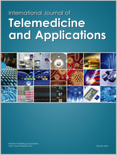
International Journal of Telemedicine and Applications
Empowering healthcare professionals with cutting-edge insights.International Journal of Telemedicine and Applications is a premier open-access journal published by HINDAWI LTD, focused on the rapidly evolving field of telemedicine and health informatics. With an ISSN of 1687-6415 and E-ISSN of 1687-6423, this journal has been a key resource for researchers, healthcare professionals, and students since its inception in 2007. Based in Egypt, the journal has established a global presence, reflected in its diverse range of articles that cover topics from computer networks to health information management. Its impact is underscored by its impressive rankings in Scopus, including notable positions such as 34th in Health Informatics and 15th in Health Information Management. The journal is classified in Q2 quartiles for four influential categories, showcasing its relevance and contribution to the field. With an ongoing publication timeline from 2008 to 2024, International Journal of Telemedicine and Applications is crucial for advancing knowledge and practice in telemedicine, offering researchers and practitioners the opportunity to explore innovative solutions in healthcare delivery.

Lancet Digital Health
Advancing the Future of Healthcare Through Digital Innovation.Lancet Digital Health is an esteemed Open Access journal published by ELSEVIER, dedicated to advancing the interdisciplinary field of digital health. Since its inception in 2019, the journal has rapidly established itself as a leading platform for disseminating high-quality research focusing on the implications of digital technology in healthcare delivery, health informatics, and patient management. Renowned for its rigorous peer-review process and commitment to academic excellence, Lancet Digital Health currently holds prestigious Q1 rankings across multiple categories including Decision Sciences, Health Informatics, and Medicine (miscellaneous) as of 2023. With an impressive impact in its field—ranked #1 in Health Informatics and within the top percentile of related disciplines—this journal offers vital insights into the ongoing transformations within health systems globally. Researchers, healthcare professionals, and students alike will find a wealth of cutting-edge studies, practical applications, and discussions on the future of digital health, fostering an evidence-based dialogue that is essential in today's rapidly evolving medical landscape.

Healthcare Technology Letters
Advancing healthcare through innovative technology insights.Healthcare Technology Letters is a leading open-access journal published by WILEY that has been at the forefront of disseminating cutting-edge research in the field of health informatics and health information management since its inception in 2014. With an E-ISSN of 2053-3713, this esteemed journal is recognized for its commitment to advancing knowledge and practice in healthcare technology, making it a vital resource for researchers, professionals, and students alike. The journal's scope encompasses a wide range of topics, including digital health solutions, data management, and innovative technologies that enhance patient care. It holds a respectable position in the academic community, featuring a Q3 ranking in both health informatics and health information management as of 2023, and consistently contributing to high-impact research evidenced by its Scopus rankings. By providing open access to its content since 2017, Healthcare Technology Letters ensures that valuable insights and breakthroughs can reach a broader audience, furthering the impact of its published work on the global health landscape.
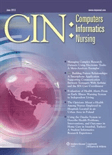
CIN-COMPUTERS INFORMATICS NURSING
Elevating Nursing Practice with Evidence-Based InformaticsCIN-COMPUTERS INFORMATICS NURSING is a distinguished journal that publishes cutting-edge research at the intersection of nursing and information technology. Published by Lippincott Williams & Wilkins, the journal has been a pivotal platform since 2002, catering to the needs of health informatics professionals and nursing researchers. With an impressive impact factor and ranked within Q2 in Nursing (miscellaneous) and other relevant categories, it serves as a key resource for advancing knowledge and best practices in the field. The journal's inclusion in important databases ensures broad visibility and access to the latest findings that influence healthcare delivery. CIN-COMPUTERS INFORMATICS NURSING welcomes a diverse range of articles, including empirical studies, reviews, and innovative methodology approaches, making it an invaluable asset for clinicians, educators, and scholars dedicated to enhancing nursing informatics and improving patient outcomes.
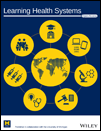
Learning Health Systems
Transforming data into actionable health solutions.Learning Health Systems is a premier open access journal published by WILEY that has been at the forefront of innovation in the fields of Health Informatics, Health Information Management, and Public Health since its inception in 2016. With a dedicated focus on the intersection of clinical practice and health technology, this journal is pivotal for researchers, professionals, and students seeking to advance the knowledge base in these critical areas. The journal enjoys a robust reputation, boasting a Q1 ranking in multiple categories as of 2023, and ranking within the top percentiles in both Medicine and Health Professions across various metrics. Designed to foster collaboration and dissemination of cutting-edge research, Learning Health Systems is committed to bridging gaps between data science and practical health applications while providing an accessible platform for transformative ideas. It invites contributions that challenge existing paradigms and promote innovative solutions that enhance healthcare delivery and patient outcomes.

Health Information Management Journal
Navigating the Intersection of Health and InformationHealth Information Management Journal, published by SAGE Publications Inc., is a premier academic resource dedicated to the intersection of health informatics, health information management, health policy, and leadership in health services. With an impressive track record since its inception in 2002, this journal steadily contributes to scholarly dialogue and innovation in the field, holding a commendable Q2 ranking in Health Informatics, Health Information Management, and Health Policy, and a distinguished Q1 ranking in Leadership and Management as of 2023. As a critical platform for researchers, professionals, and students, it fosters the dissemination of cutting-edge research and practical applications, bridging the gap between theory and practice. Though not an open-access journal, it provides a wealth of subscription-based resources that are invaluable for advancing knowledge and improving health systems globally. The journal’s commitment to high-quality, peer-reviewed content ensures that it remains a vital tool for anyone invested in the future of health information management.

ACM Transactions on Management Information Systems
Elevating Research Standards in Digital ManagementACM Transactions on Management Information Systems is a prestigious journal published by the Association for Computing Machinery, dedicated to advancing the interdisciplinary field of management information systems. With an impact factor that reflects its esteemed position within the academic community, it has achieved remarkable rankings, including being classified as Q1 in Computer Science (miscellaneous) and Q2 in Management Information Systems as of 2023. Researchers and practitioners alike recognize this journal for its rigorous peer-reviewed articles that explore innovations, methodologies, and applications in information systems management, ensuring its relevance in today's ever-evolving digital landscape. The journal offers a vital platform for sharing cutting-edge research, supported by the publisher's commitment to excellence in the field, making it an essential resource for scholars and professionals aiming to stay at the forefront of management information systems research.
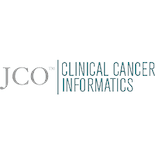
JCO Clinical Cancer Informatics
Advancing cancer care through innovative informatics.Welcome to JCO Clinical Cancer Informatics, an esteemed journal at the forefront of the intersection between oncology and health informatics. Published by Lippincott Williams & Wilkins, this journal is dedicated to advancing the understanding and application of cancer data through innovative informatics solutions. Since its inception in 2017, JCO Clinical Cancer Informatics has established itself as a critical resource for researchers, practitioners, and students, as evidenced by its high rankings in the 2023 Scimago Quartiles—Q2 in Cancer Research and Q1 in both Health Informatics and Oncology. With a commitment to open access, this journal aims to disseminate groundbreaking research findings that enhance cancer care and inform public health strategies. Positioned in the United States, it serves as a pivotal platform for sharing knowledge and fostering collaboration within the global cancer research community.